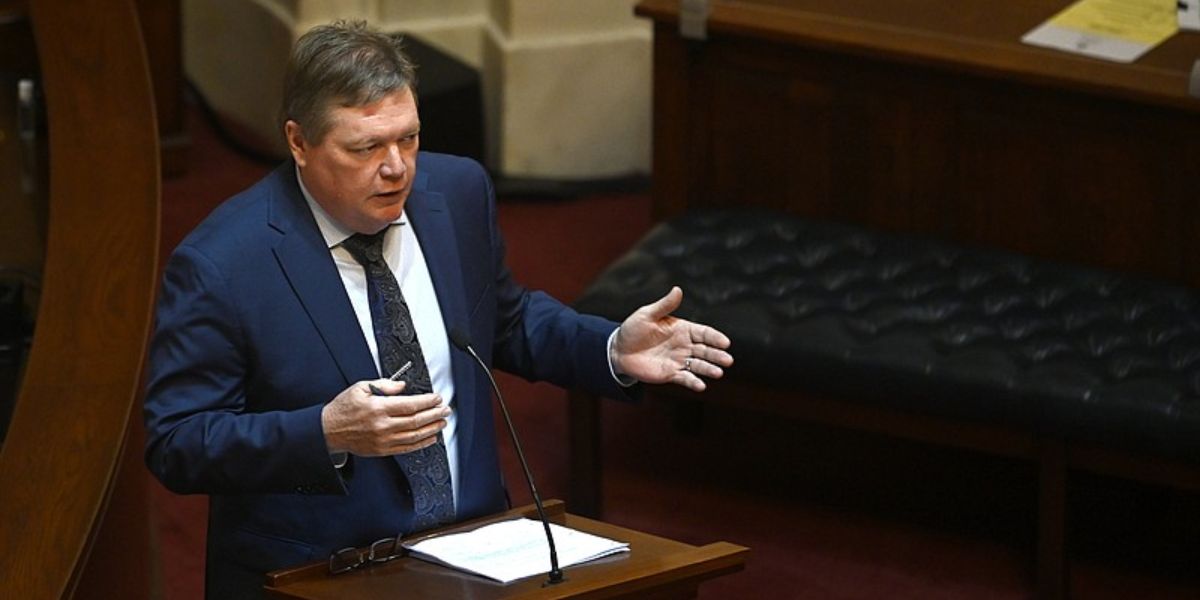Arkansas Senators Propose Groundbreaking Cryptocurrency Mining Regulations
On Thursday, April 18, 2024, Arkansas Republican Senators Joshua Bryant of Rogers and Missy Irvin of Mountain View will bring proposals proposing regulations for cryptocurrency mining before the Senate City, County, and Local Affairs Committee. (Tess Vrbin / Arkansas Advocate)
An Arkansas Senate committee overwhelmingly adopted two proposals Thursday that would regulate cryptocurrency mining companies, and the committee will reconvene on Tuesday to hear additional public comments on the rules.
Republican Sens. Joshua Bryant of Rogers and Missy Irvin of Mountain View submitted the proposals on Wednesday after the House passed resolutions allowing them to be introduced during the budget session. The Senate approved identical resolutions on April 11.
Act 851 of 2023, also known as the Arkansas Data Centers Act, limited local governments’ power to oversee crypto mining, sparking debate over whether and how much to regulate them at the state level.
Crypto mines, massive groupings of computers that harvest digital currency, are frequently seen in rural regions due to their large footprint. They also demand a substantial amount of electricity and water to keep computers cool.
There are cryptocurrency miners in DeWitt and the Bono village near Greenbrier, and officials have expressed worry about foreign ownership and whether the mining constitutes a national security danger. Additionally, Greenbrier-area residents have filed a complaint alleging noise pollution from the local cryptocurrency mine, which is located in Irvin’s district.
Six of eight crypto mining resolutions fall short in Arkansas House
Bryant’s bill, Senate Bill 78, would limit the noise of Arkansas crypto mining, ban them from being owned by certain foreign corporations, and let local governments to establish mine-regulating laws.
The bill’s noise regulating measures include “using liquid cooling or submerged cooling” techniques, enclosing computers in structures to reduce outside noise, and being at least 2,000 feet away from “the nearest residential or commercial structure.”
Residents or business owners within 2,000 feet of a cryptocurrency mine might seek legal redress for noise concerns in county circuit courts, Bryant said. The bill also emphasizes that people can mine cryptocurrency from their homes without government involvement, he said.
“Digital asset mining in the home is limited to the confines of what your utilities can provide you based on your normal retail rate,” Mr. Bryant stated. “This is a hobby; you can do it on your computer if you want.”If you want to run a business out of your home using this and that, you must adhere to local regulations and ordinances.”
Senate Bill 79, introduced by Irvin, would require the state Department of Energy and Environment to issue licenses to cryptocurrency mines. It would also force the department to update parliamentary committees on its crypto-mining regulation practices.
Both pieces of legislation have emergency clauses, which means they will take effect immediately if Governor Sarah Huckabee Sanders signs them into law. Six other prospective crypto regulatory policies passed the Senate but failed in the House in the last week.
Senate Bill 78 is largely responsible for one of the failed resolutions, which would have allowed local governments to control cryptocurrency mining and prohibited ownership by foreign countries from which the federal International Traffic in Arms Regulations prohibits imports and exports.
Irvin stated that the two laws establish the basis for the employment of “several layers of tools” to govern the cryptocurrency industry as well as future legislative talks about whether to impose more rules.
“There’s a lot we don’t know and that we still are learning, so I think we need the time to flesh all that out,” she remarked in a recent interview. Jerry Lee Bogard and Kenneth Graves, both locals of Arkansas County, where the crypto mine near DeWitt is located, spoke in support of both legislations.
Graves serves on the DeWitt School Board, and he claims there is a school around two and a half miles from the cryptocurrency mine. Noise from the mine can go up to eight and a half miles on a windy day, and he does not want the noise or the mine’s electrical usage to interfere with children’s education, he added.
Bogard owns Grand Prairie Farming and Water Company, a water conservation company in Stuttgart, and he is concerned about the impact of crypto miners on Arkansas’ groundwater supplies. The Sparta/Memphis Aquifer in East Arkansas provides water that is safe to drink but does not replenish rapidly.
“One crypto mine may use a few million gallons of water,” Bogard pointed out. “That is not a major deal [on its own], but it is significant since it is coming from an aquifer on which we rely for human consumption. The presence of 20 crypto mining may cause concern for adjacent small villages with old infrastructure and reliance on Sparta Aquifer wells. John Bethel, Entergy’s director of public affairs, answered committee members’ queries concerning the impact of cryptocurrency mines on local energy systems.
Bethel stated that the utility company tells clients who are putting a burden on the grid, such as cryptocurrency miners, that their access to energy will be cut off if they do not lower their usage. Customers who do not comply with the notification will face financial penalties, which Entergy will subsequently waive if the customer fails to comply only twice in a year, Bethel stated.
Committee head Sen. Scott Flippo, R-Bull Shoals, warned individuals who ignore Entergy’s warnings may face harsher penalties.
Earlier Thursday, the Senate decided to suspend the rule requiring a bill to be heard in committee within 24 hours of introduction. Sen. Stephanie Flowers, D-Pine Bluff, voiced concern that the decision will limit public discussion because her district covers part of Arkansas County.
Bryant and Irvin agreed, at Flippo’s suggestion, to return the measures to the committee next week so that they may get additional public comment at Tuesday’s meeting.











